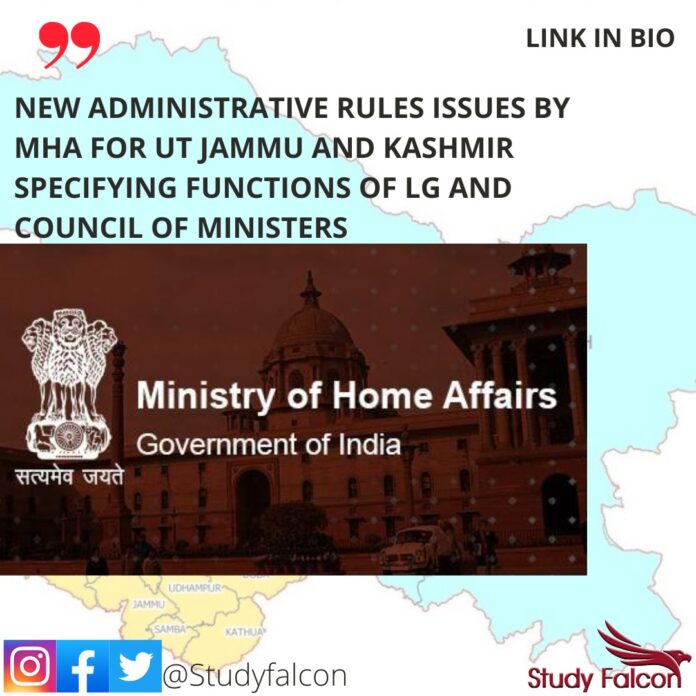The Ministry of Home Affairs (MHA) has notified new rules for administration in the Union Territory of Jammu and Kashmir that specify the functions of the Lieutenant Governor (LG) and the Council of Ministers.
Roles and powers of LG:
Police, public order, All India Services and anti-corruption, will fall under the executive functions of the LG, implying that the Chief Minister or the Council of Ministers will have no say in their functioning. Proposals or matters which affect or are likely to affect the peace and tranquility of the UT or the interest of any minority community, the Scheduled Castes, the Scheduled Tribes and the Backward Classes “shall essentially be submitted to the Lieutenant Governor through the Chief Secretary, under intimation to the Chief Minister, before issuing any orders.” In case of difference of opinion between the LG and a Minister when no agreement could be reached even after a month, the “decision of the Lieutenant Governor shall be deemed to have been accepted by the Council of Ministers.

Role of the President:
In case of difference of opinion between the Lieutenant Governor and the Council with regard to any matter, the Lieutenant Governor shall refer it to the Central Government for the decision of the President and shall act according to the decision of the President. The LG of J&K has been empowered to pass directions in such situations that action taken by the Council of Ministers will be suspended for as long as it takes the President of India to decide on the cases referred to her.
Role of Council of Ministers, led by the Chief Minister:
They will decide service matters of non-All India Services officers, proposal to impose new tax, land revenue, sale grant or lease of government property, reconstituting departments or offices and draft legislation. Any matter which is likely to bring the Government of the Union territory into controversy with the Central Government or with any State Government, shall, as soon as possible, be brought to the notice of the LG and the Chief Minister by the secretary concerned through the Chief Secretary.

Role of the Central Government:
The Lieutenant Governor shall make a prior reference to the Central government with respect to proposals of the following kinds:
those affecting the relations of the Center with any state government, the Supreme Court of India or any other high court; proposals for the appointment of Chief Secretary and Director General of Police; important cases which affect or are likely to affect the peace and tranquility of the Union Territory; and cases which affect or are likely to affect the interests of any minority community, Scheduled Castes or the Backward Classes.
Implications
In the erstwhile state of Jammu and Kashmir, when it had special status, the chief minister was the most powerful person in the decision-making process.With the new rules, CM has been reduced to an ornamental figure. He would not even have the power to transfer a constable of the Jammu & Kashmir Police.










